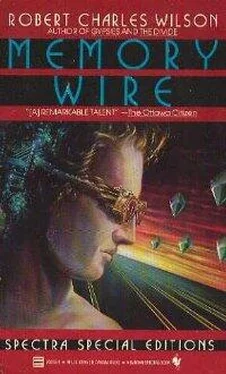Robert Wilson - Memory Wire
Здесь есть возможность читать онлайн «Robert Wilson - Memory Wire» весь текст электронной книги совершенно бесплатно (целиком полную версию без сокращений). В некоторых случаях можно слушать аудио, скачать через торрент в формате fb2 и присутствует краткое содержание. Год выпуска: 1987, ISBN: 1987, Издательство: Bantam Spectra, Жанр: Фантастика и фэнтези, на английском языке. Описание произведения, (предисловие) а так же отзывы посетителей доступны на портале библиотеки ЛибКат.
- Название:Memory Wire
- Автор:
- Издательство:Bantam Spectra
- Жанр:
- Год:1987
- ISBN:978-0-553-26853-9
- Рейтинг книги:4 / 5. Голосов: 1
-
Избранное:Добавить в избранное
- Отзывы:
-
Ваша оценка:
- 80
- 1
- 2
- 3
- 4
- 5
Memory Wire: краткое содержание, описание и аннотация
Предлагаем к чтению аннотацию, описание, краткое содержание или предисловие (зависит от того, что написал сам автор книги «Memory Wire»). Если вы не нашли необходимую информацию о книге — напишите в комментариях, мы постараемся отыскать её.
Memory Wire — читать онлайн бесплатно полную книгу (весь текст) целиком
Ниже представлен текст книги, разбитый по страницам. Система сохранения места последней прочитанной страницы, позволяет с удобством читать онлайн бесплатно книгу «Memory Wire», без необходимости каждый раз заново искать на чём Вы остановились. Поставьте закладку, и сможете в любой момент перейти на страницу, на которой закончили чтение.
Интервал:
Закладка:
But he was aware of the forces that had been mustered against them, and he was far enough now from the consolations of wu-nien that he worried especially about Teresa.
He looked at the cafe and saw Byron waving him back. Denny had left. The negotiations had been brief.
Keller hiked wearily up the cobbled street. “Did he deal?”
Byron shook his head. “He’ll call us.”
They walked in silence back to the hotel off the Ver-o-Peso. Byron knocked at the door—there was no answer —then plugged his key into the lock. The mechanism clattered, the door eased open. Byron hesitated in the doorway. Keller, anxious now, pushed past him.
Teresa lay curled on the floor, the dreamstone clutched in both hands.
2. She was embedded in the dream now.
It was all around her and more vivid than it had ever been. It surrounded her like an ocean, and at the same time she contained it: an embrace of knowledge. She knew more than she had ever known.
A surfeit of questions. An excess of answers.
She was curious about the blue-winged people. In so many ways they seemed so familiar—so human. She was able to take in their history at a glance now, to remember it, and the similarities, she thought, were awesome. Like human beings, they had evolved from arboreal creatures sometime in the ancient past. They possessed opposable thumbs, a large cranial capacity, a vast array of cultures and languages. They had mastered human technologies: flint knives, fire, agriculture, iron. She knew all this instantly and without effort.
So human, she thought. And yet…
Their history was curiously placid. There were wars, but fewer and briefer than human wars had been. Their religions were more often ecstatic than militant. They were pantheists and nature worshippers. They were quick to develop written language, and quickly fostered an almost universal literacy. They had been using crude printing presses as early as their Bronze Age.
They possessed a genius for information technology which had led them from books to binary circuits to molecular memories and beyond that into storage-retrieval mechanisms so subtle and immediate she could not begin to comprehend them. She understood that the oneiroliths were the end product of this process, its final and most absolute incarnation.
The stones were more than they seemed. They existed in a complex hidden topology, each linked to each, each in some sense a reflection of each, each with a special affinity for the geometry of sapient awareness… and their function was almost ludicrously simple. They remembered.
They contained the past, or were a kind of passport to it: the distinction had been lost. They were both history book and time machine, limited only by a kind of proximity effect. The Pau Seco stone contained most of the history of the Exotics and much of the modern history of the Earth. Beyond those margins—as if that weren’t enough—she was unable to see.
The oldest memories were dim. She saw the blue people most vividly as they had been at their apex: a world made so strange that it defied her understanding. They had expanded to the limits of their planetary system, colonized the cold ring of dust and stone that marked its farthest outpost, constructed there the fragile, huge interstellar vehicles that went winging out like butterflies between the stars. The pilots of these vessels were immortal, binary intelligences undisturbed by the passage of vast spans of time but recognizably modeled after the winged people, and in some sense descended from them. The butterfly ships in their diaspora mapped more barren worlds than Teresa cared to think about. One of them had angled past the Earth when the Chou Dynasty was succeeding the Shang and the Assyrians were marching into Babylon. (A few neolithic American tribes actually saw the craft in its looping polar orbit: a star of many colors. The observant Babylonians were preoccupied; the Chinese were in the wrong place.) It was a divided and primitive world— still is, Teresa thought distantly—but the winged people had deemed it at least potentially worthy of their gift (it was a gift), which they directed, perhaps wisely, into the then-uninhabited and unnamed depths of the Mato Grosso. A garden for the tree of knowledge.
And winged away once more, and passed out of Teresa’s knowing.
She had seen much of this before, but scrambled and chaotic; it had never made sense to her except as visionary flashes, the fractured output of the cruder dreamstones. She was astonished now at the scope of it. The stones, she understood, were magnets of consciousness. They absorbed and recorded the flickering traces of experience … at a distance, without contact, automatically, through some mechanism beyond her grasp. Lives, she thought: they stored and recorded the passing of lives.
And so the human past was here too. A Babel of languages and customs and battles, sanguinary births and premature deaths. She could have descended at will into any part of it (the thought was dizzying), lived a moment with Hammurabi or Aristotle or any of the peasant millions who had marched into nameless oblivion. But not now, she thought. Later. Enough to know that they were preserved here, that in some important sense they had not died. She preferred for the moment to hover above it all, to take in the shape of it entirely and at once, humanity like one creature, a single voice, a river.
She contemplated it for what seemed an endless time; and would have gone on, enraptured, but for the voice that called her away.
I’m here, it said… faint and faraway, but terribly persistent. I’ve always been here.
It drew her down. She gasped, frightened now.
She gasped. Keller bent over her, worried.
“Don’t touch her,” Byron warned.
But she was trembling, wrapped around the dreamstone and clutching it to herself. She was in some kind of pain, he thought. Or dreaming some unbearable dream.
“Let her work it out,” Byron said. “There’s nothing you can do for her.”
“It’s hurting her.”
“She’ll come out of it.”
“How do you know?” He recognized that he was close to panic. Wu-nien, he thought. But the instinct had deserted him. “It’s not the same. It’s a new kind of stone.”
“It’s her decision.”
She shuddered against the floor, eyes squeezed shut. She looked lost, Keller thought: fallen into some chasm of herself. He wanted to shake her.
Byron put a hand on him, restraining him. But the phone rang suddenly. “Let it happen,” Byron said, and turned away. The phone’s CRT had burned out years ago; Byron gazed into a carbonized blankness.
Keller turned back to Teresa, took a blanket from the bed and spread it over her. She opened her mouth and made a brief, anguished cry.
Memory, Keller thought helplessly.
He knew what it meant. He could have told her.
She saw the little girl.
She saw the little girl living in a float shack somewhere out by the far margins of the tidal dams, out of sight of the mainland. She knew a few things about the little girl now. Things she had not known before.
The little girl was a good little girl. The little girl was obedient. The little girl lived with her mother and spoke good and careful English, not the Hispanic patois of her playmates. The little girl had learned to read at a Public Works school operating out of an abandoned grain storehouse which stood on concrete stilts above the floating ghetto. The little girl was cheerful and blithely unaware of her condition of poverty, except when the government checks failed to clear, or the time when the bank machines closed down after the riots. Then she was hungry. And frightened, and irritable. But food came eventually, and she learned in time to endure even these brief bouts of hunger: she was confident that they would end.
Читать дальшеИнтервал:
Закладка:
Похожие книги на «Memory Wire»
Представляем Вашему вниманию похожие книги на «Memory Wire» списком для выбора. Мы отобрали схожую по названию и смыслу литературу в надежде предоставить читателям больше вариантов отыскать новые, интересные, ещё непрочитанные произведения.
Обсуждение, отзывы о книге «Memory Wire» и просто собственные мнения читателей. Оставьте ваши комментарии, напишите, что Вы думаете о произведении, его смысле или главных героях. Укажите что конкретно понравилось, а что нет, и почему Вы так считаете.












